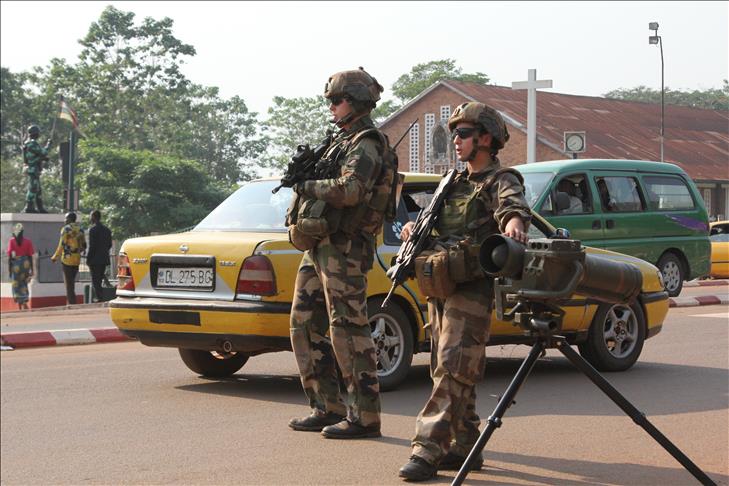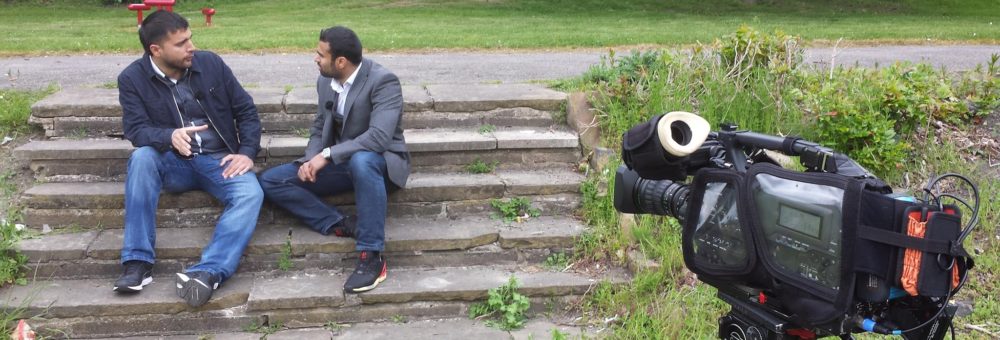AA investigates attacks against Muslims carried out by the Christian militia known as the “anti-balaka,” meaning “anti-machete.”

BANGUI
Since the outbreak of the conflict in the Central African Republic (CAR), reports have focused on the Muslim rebel seleka group and the atrocities it has been accused of perpetrating against civilians.
But little, if anything, has been reported about attacks against Muslims carried out by the Christian militia known as the “anti-balaka,” meaning “anti-machete.”
In Kilometer 5, a bustling Muslim neighborhood in the capital Bangui, 48-year-old Bashir sat on a plastic rug at the back of some shops off the main road.
He used to live in Fouh, a predominately Christian area of the capital that also had a Muslim minority.
“When the trouble started, the anti-balaka attacked the Muslims in the area,” Bashir, wearing a traditional white dara (a long open cloak) and a white hat, told Anadolu Agency.
“The local mosque was destroyed, just like my home,” he lamented.
Bashir claimed to have witnessed the murder of four people, including his younger brother, before he managed to escape.
“The machete hit him on the side of the neck,” he recalled tearfully.
“There were so many people – not just anti-balaka, but Christians from around the area.”
Hundreds have been confirmed killed in recent days in Bangui alone – victims of tit-for-tat sectarian violence between seleka and anti-balaka militias.
CAR, a mineral-rich landlocked country, descended into anarchy in March, when Seleka rebels ousted Christian president François Bozize, who had come to power in a 2003 coup.
According to UN estimates, more than 400,000 people – nearly ten percent of the country’s 4.6 million-strong population – have abandoned their homes as a result of the violence.
-Mutilated-
Yahiya Abu Bakr, chairman of a committee that oversees the local mosque, said at least 108 Muslims from the area had been killed in recent violence.
“Women, children, even pregnant women were slaughtered by the anti-Balaka,” he claimed.
“The anti-balaka cut off people’s limbs,” Abu Bakr told AA. “I also saw bodies that had their genitals removed,” he said.
“We perform the funeral prayers here, so I know about the injuries sustained by those that were killed,” insisted Abu Bakr.
The most recent funeral was on Saturday.
AA reporter was shown mobile-phone footage allegedly filmed at the scene of anti-Balaka attacks perpetrated last week.
The gruesome video shows several people lying on the floor in a pool of blood. Some appeared to have been horrifically mutilated as they breathed their last.
People standing around the dying Muslims were shouting “la ila ha illallah” – “There is no God but Allah” – apparently encouraging the dying men to pronounce the Muslim declaration of faith before they expired.
At one point, the video shows a man who is still alive being picked up and laid onto a stretcher, pieces of his mutilated body hanging off.
There was no way of independently verifying the video, its content or where or when it had been filmed.
“We want peace,” asserted Abu Bakr, the mosque chairman.
“We are ready to call for it, but the anti-balaka are the ones that are doing the provocations by killing Muslims and destroying mosques,” he said.
Not far from the mosque, a number of internally displaced Muslims took shelter.
“They killed four of my children: two sons and two daughters,” Salma, who declined to give her second name, told AA.
The slain children, she said, were aged ten, eight, six and two.
The mother – visibly traumatized – made very little eye contact as she braided her young daughter’s hair.
She stopped a few times with a blank and distant look in her eyes.
“My father and mother were also killed in the attack,” added Salma.
As a French military convoy made its way through the Muslim neighborhood, Umar Didi watched it scornfully.
“They are the troublemakers!” he shouted.
“People were killed in front of French soldiers who did nothing,” he claimed.
Umar Hussain, a Muslim businessman, suggested to have witnessed such an incident.
“During the troubles, some people decided to carry knives with them for their own protection because there was a lot of looting and the anti-balaka had gone on a killing spree,” he told AA.
“The French disarmed some people in front of the Christian mobs, and then just left them at the mob’s mercy,” Hussain claimed.
“The mob murdered them in the most brutal way, while the French stood by and did nothing. How is this peacekeeping?” he asked.
A spokesman for the French troops deployed in the country was not immediately available to comment on the specific incident.
But General Francisco Soriano, commander of the French contingent, has acknowledged “misconceptions” about his troops.
“Our operation is not partial,” he told reporters on Tuesday at the French military base near Bangui airport. “We take into consideration both parties.”
Hussain, for his part, angrily disagreed.
“We don’t trust the French because we’ve seen their one-sided actions,” he fumed.
“How can they just leave people to be slaughtered – and watch while it takes place?”
Read the original article published in Anadolu Agency on 18 December 2013
